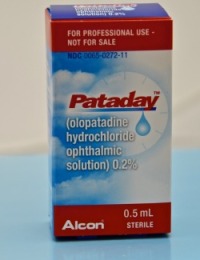Ocular Allergies
In the United States, it is estimated that over 20 million people suffer from ocular allergies and this number is on the rise. Ocular allergies come when histamine is released from mast cells of the conjunctiva, the white of the eye. When pollen, dust or another allergen comes into contact with the mast cells of the conjunctiva a type one hypersensitivity reaction occurs where there is a release of histamine and other mediators leading to inflammation.
Allergic symptoms may be seasonal, usually in the late spring or fall when pollen counts are at their highest. This is common in persons with allergic rhinitis, asthma, eczema or hay fever. Up to 80% of hay fever patients may have allergic eye conditions. Many times the actual cause of the allergy may be unknown.
Symptoms of Ocular Allergies
The primary symptom of ocular allergies is itching. Other common symptoms include redness of the white of the eye and lids, lid swelling, tearing of the eyes, light sensitivity, grittiness and in some cases swollen eye(s).
Treatment of Ocular Allergies
There are many different treatments available to help alleviate and prevent future symptoms from  occurring. First and foremost is the avoidance of the allergen. In some cases, this could be dust, pets, make-up, medications, detergents, etc. and avoiding these substance is crucial to long term relief. When you do come into contact with a specific allergen, there are many different medications available to help.
occurring. First and foremost is the avoidance of the allergen. In some cases, this could be dust, pets, make-up, medications, detergents, etc. and avoiding these substance is crucial to long term relief. When you do come into contact with a specific allergen, there are many different medications available to help.
Anti-histamine and mast cell stabilizer prescription eye medications may be prescribed by our doctors to help. The anti-histamines work quickly to decrease the itchiness of the eyes while the mast cell stabilizers work to prevent the release of histamine if exposed to the allergen in the future. These medications are very good at controlling the acute allergy attack and managing the long term as well. In severe cases, our doctors may need to prescribe ocular steroids to decrease the inflammatory response and give you relief quicker in conjunction with the mast cell stabilizer.
If you have any of the symptoms of ocular allergies, please call and schedule an appointment with our doctors.
